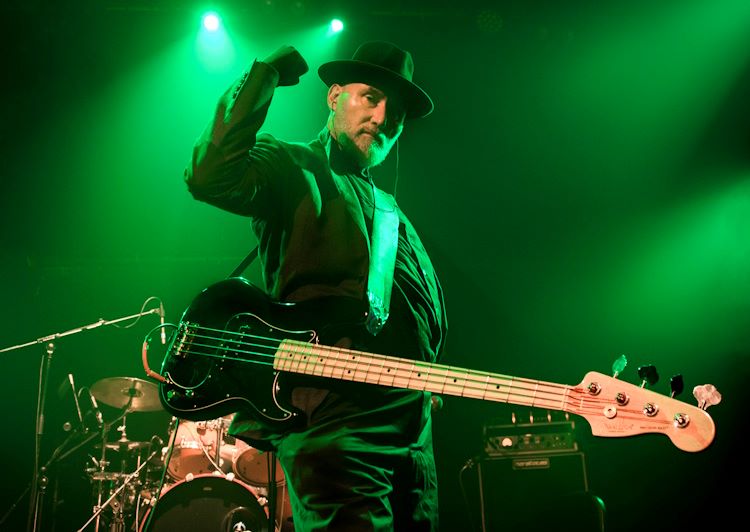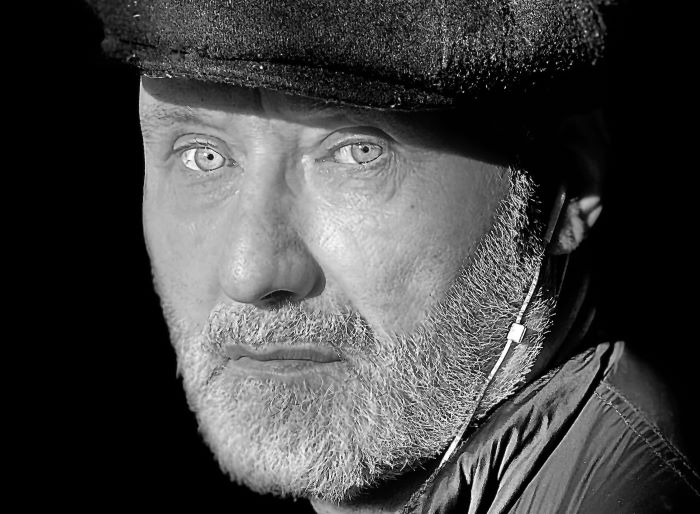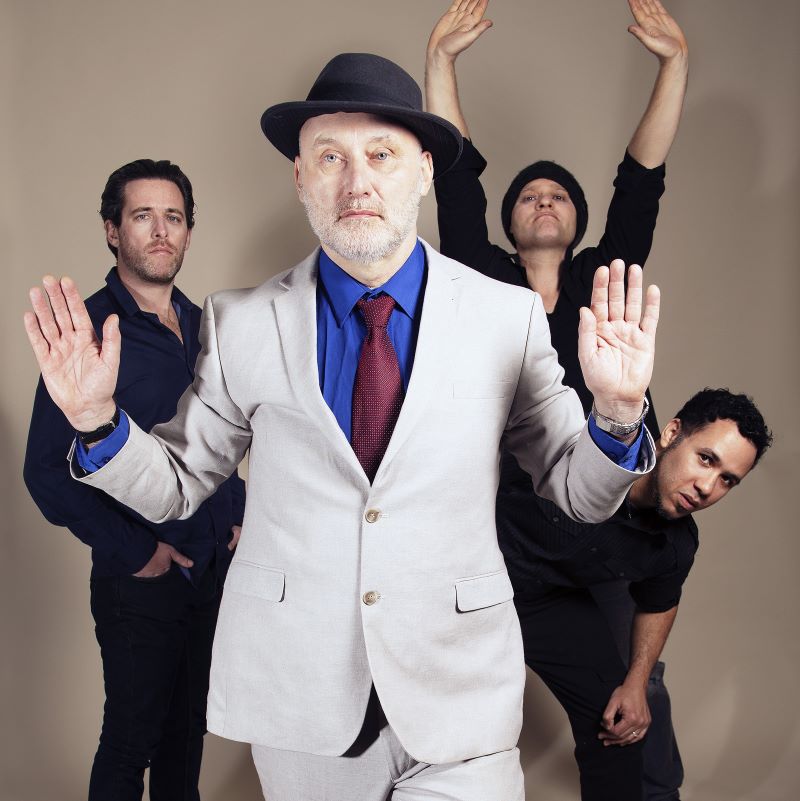By Sam Wise.
Jah Wobble, at least for me, was one of those names that hovers at the periphery of your consciousness without you necessarily being certain why. I remember that in my case, he first came into actual focus in the runup to a Womad festival in the early 2000s, where he was performing with the Invaders of the Heart. Recognising the name I looked him up, made the connection with Public Image Ltd, and came along with expectations that were not remotely aligned to what he actually played. I couldn’t have known how much more there is to Jah Wobble than my understanding of Johnny Rotten’s post Pistols collective gave me.
I had thought of opening by asking him whether he preferred to be addressed as Jah, or as Mr Wobble, but thought better of it. I explained to him that I had considered and abandoned that opening, and he started to tell me, very seriously, about the origin story of his name (a very drunk Sid Vicious attempted to introduce him by his given name, John Wardle, but was unable to enunciate it, and therefore he became once and forever Jah Wobble). I stopped him to say that no, in fact I had just been planning it as a smart-arse comment, which caused him to darken a little, and warn be that it was not advisable to be a smart-arse with him, and that whatever I gave him, he could give back in double measure. That really summarises my experience of him; a very charming and interesting man who doesn’t take himself too seriously, but also a man on whose bad side you would prefer not to be.
I had read in an interview that Wardle once said the first bassline he ever wrote, the eponymous Public Image Ltd, went top 10, and it had been downhill commercially ever since. I wondered whether music had given him all he wanted it to, or would he rather have had a private jet and a guitar shaped swimming pool?
“I’ve got absolutely no complaints, I’m sat ‘ere in Chelsea talking to you,” he says.
“Got enough money, and money is important, but it’s never the main driver. I decided early on that I wanted to do my thing, and it’s gone well. You go down the path you’re supposed to go on, and luckily, since about 1990, I’ve been alright for money. Back in 2014/2015, running a record label at the height of streaming kicking off was very hard, and at that point, it wasn’t worth making a record, but I make my money from live performance now. Things change fast, but we find our way. “

Since leaving PiL, frustrated with the lack of activity and ambition shown by his bandmates, John has firmly taken charge of his career. Rather than joining a band as the bass player, he has always led his own projects, with himself as the centre and driving force, whether you see him as a frontman or not. Looking back over the history of popular music, there have been very few band-leading bassists; Mark King and Sly Stone jump to mind, but I couldn’t think of anyone but Wobble himself in the more bass heavy genres in which he has established himself. I wondered how he had managed to do that, or maybe more importantly, why more people haven’t?
“People ask me what I do, and I say “I’m the bass player, I’m also the band leader,”” he says.
“I’m happy with it, bass is a great instrument, and it’s nice when it comes to the fore. It’s a mixture of things; one of the most prosaic, early on, is I was the guy who booked the band, and being willing to take care of things can mean you end up in charge. A lot of musicians are a mess, and if you can keep it together and get things done, that means a lot. I’m a football fan, and Franz Beckenbauer, Bobby Moore; both were defenders, but caught the eye, and made the whole team work. On bass, you’re the pivot between the drums and the melody; I’ve got a couple of little solos now, and I do what I think of as a disturbing face when I do them. But it’s about being efficient and effective. Jazz players can be like that, virtuosic, but not being self-indulgent. I run a music community thing, more guitarists come than anything else, and at the end of the evening, everyone wants to play blues which I hate. So many notes, with nothing to say, a lot of the time.”
John’s career has been incredibly varied, and he’s been able to indulge many interesting ideas. One of the albums I listened to in preparation for this interview was The Bus Routes of South London, a series of electronica reflections which he told me a little about.
“I like to walk, but I can’t walk at the moment because I’m getting over calf strain. Normally I would walk a long way out, in London I might walk up the Thames a lot, South West London, and get a bus back. I would take a phone, and maybe make a little musical sketch on the way back. I didn’t plan to make an album that way, but I was on a bus not long after lockdown, and I took a photo with my face and the view out of the bus, and I put it up, like you have to do immediately these days. Everyone really loved it, there was me, on this empty bus, sad solitary looking figure on an empty bus travelling across London, and it was evocative, and made me think “Let’s make a record from that”. The most esoteric thing I ever did was probably a Requiem mass, which genuinely followed the right form and everything. It’s a luxury really, to be able to explore ideas like that.”
Whether it’s his working class background, or the fact that he has tended to remain relatively “underground” is impossible to say, but Wardle is clearly still very grounded in the realities of being an ordinary person in this country. It comes out in his anger at the system, at Tories, and at the lack of vision of his countrymen both of his own generation and succeeding ones. This jaded worldview doesn’t result in inaction however; John appears to be a wellspring of ideas and inspiration. He has a vast range of opportunities to play with great musicians, and I asked him whether he ever wishes he could just show up at a local venue and jam? I should not have been surprised at his answer.
“I do, I enjoy hanging out, and I still really like playing. I can’t help but be as serious about it there as I am everywhere else. [former QPR legend] Gareth Ainsworth and I played football together at a charity match, and he was just as serious about that as his pro career. I run a music session kind of thing, and the idea was just to combat loneliness with older blokes, because I knew a lot who used to play but didn’t anymore, and also wanted to find people who never did play. I talked to a friend at Merton council, and we kicked it off, and we ended up with lots of women, youngsters, all ages genders sexes etc. We built a studio at Wimbledon Library, there’s a big space behind it, the Merton Arts Space, and we have a thing once a week, a jam session, bands come along and play and show what they have been working on, and sometimes people will make an album. We go for 3 hours, nobody is left out, you might only get 20 minutes, but there’s spaces where people can go and work things out, you’ll have jams happening. It’s very self-organising; far from chaotic, it worries me that it might be running too smoothly. You just think, should we create some abrasion here somewhere. We did have a lot of Japanese people coming before lockdown, and we were doing a lot electric period Miles stuff. That could verge on chaotic, and I miss them.“

John is currently on tour, and has said it’s his best lineup and best shows ever. This feels a little similar to sports stars always claiming they are in the best shape of their lives, and I asked him whether it was true, or just rose tinted spectacles?
“It’s really true, they’ve been together for 15 years, and they will just say “You just tell us where and when”. We play three hour shows, and they can just play. A lot of players over the years wouldn’t quite learn the music, and would feel like that was sort of ok, but what do you think, [here there is a flash of anger] you think I’m a c**t? You think I can’t tell? It says something about you when you feel like you can get through, that you’re good enough to not really prepare and not really learn the stuff. These guys are very serious, and they get the appreciation they deserve from the punters.”
Lastly, I knew that John had released an autobiography, Dark Luminosity, recently, and I asked him what had made him choose this moment to write it?
“It’s an expanded version of a book called “Memoirs of a Geezer”, and I liked everything about it except the title, which was a pun on Memoirs of a Geisha, and honestly felt a bit cheap and short term, so I was delighted to rename it and reword it. So much was in the original book about blue collar disaffection in East London, and I couldn’t help but want to write more because of Brexit. A lot of what I predicted came true, but I never predicted Brexit, I never thought we could be that stupid, worse than Suez. I brought the book up to speed in terms of that stuff. We lost our voice when John Smith died, New Labour didn’t have that voice for us. So I had quarter of a century to catch up. I doubt I’ll do it again, but then I had an anthology released on Trojan, never thought I could do it again, but I’ve had another two!”
- Jah Wobble will be at The LIghthouse, Poole, on May 15. For tickets and more information, click here.
- In Common is not for profit. We rely on donations from readers to keep the site running. Could you help to support us for as little as 25p a week? Please help us to carry on offering independent grass roots media. Visit: https://www.patreon.com/incommonsoton
You may also like:
Groundbreaking composer Erland Cooper brings latest project to Southampton’s Turner Sims
Charlie Barnes, live member of Bastille and solo artist, on his career of contrasts

